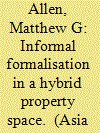| Srl | Item |
| 1 |
ID:
178283


|
|
|
|
|
| Summary/Abstract |
Papua New Guinea’s first deep-sea mining project, once touted as the first of its kind in the world, now appears to be “dead in the water.” The mining company behind it has been liquidated, the mining equipment has been rendered obsolete, and the host government has been made to look foolish for supporting the enterprise. This paper examines the application of two concepts—that of the “resource frontier” and that of the “actor-network”—to reach an understanding of the history of this apparent failure. By elaborating on the additional concept of a “network junction,” it seeks to show how arguments about the feasibility or fallibility of this particular project, and deep-sea mining proposals more broadly, have been related to arguments about a range of other issues in which scientific and technological uncertainties are associated with environmental and social impacts or environmental and political risks. Instead of seeking to explain the failure of this project by reference to the attributes of a specific type of maritime resource frontier, the paper shows how the articulation of different policy networks creates the appearance of a frontier in which human and non-human actors have combined to produce a variety of unpredictable and open-ended outcomes. From this point of view, the history of this project’s failure cannot simply be read as the outcome of a contest between two groups of human actors with clearly defined interests or ideologies, nor does it necessarily spell the end of the policy network in which this project has been embedded.
|
|
|
|
|
|
|
|
|
|
|
|
|
|
|
|
| 2 |
ID:
117142


|
|
|
|
|
| Publication |
2012.
|
| Summary/Abstract |
Across post-colonial Melanesia, the benefits and costs of 'mobilisation' of customary land for economic development remain much debated among scholars, activists, policy-makers and the donor community. This paper presents a case study from Solomon Islands of a hybrid property space in which smallholder oil palm blocks are being established on customary land through an informal 'smallholder land use approval' system. This system provides salutary evidence of how customary land can be engaged for commercial agricultural activity without recourse to formalisation. It also potentially provides a more equitable pathway for landowners, especially women and young men, to engage in the oil palm sector, with the only current alternative being the registration and leasing of land directly to the oil palm company. However, enthusiasm for the scheme must be tempered by an explicit awareness of the relationships between land, development and conflict on the island Guadalcanal where the oil palm operation is located. The nascent 'informal formalisation' and commercialisation of customary land that is taking place on Guadalcanal is subjected to a conflict analysis informed by both the recent history of violent conflict in the area and comparative experience from the village oil palm sector in neighbouring Papua New Guinea. A number of potential conflict stresses are identified and recommendations made to mitigate them.
|
|
|
|
|
|
|
|
|
|
|
|
|
|
|
|